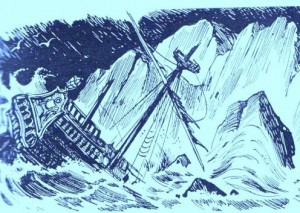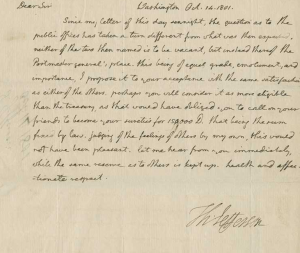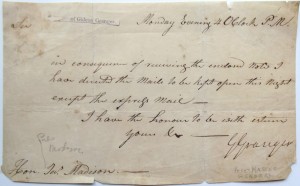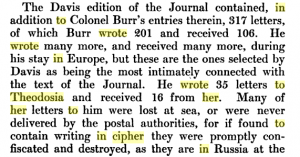The Six Crew Members Who Deserted “La Bergere” in 1785
July 28, 2013 in American History, general history, Louisiana History
There are always stories behind the story. There are always stories hidden within the story. This is one of them. Let’s begin by thinking about how the headlines today often portray cruise ship horrors where passengers are stranded with non–working toilets, no hot water, no electricity, incompetent and non-responsive foreign crews and other such inconveniences for just a few days. The passengers disembark with YouTube videos of their “trip from hell” eager to post their indignant protest over their recent voyage. Their ordeal makes the nightly news around the country and eager lawyers even emerge to get those ship passengers their due for their ruined voyage. Ruined trips aren’t a modern problem. Ship horror stories are nothing new, not even on the obscure pages of history, just ask any Cajun or Acadian historian.
More than 700,000 Cajun people are living today in Louisiana. Even more of us live outside Louisiana. Virtually every Cajun in the United States shared one common bond — their Acadian ancestors most likely arrived on one or more of these seven ships (Le Bon Papa, La Bergere, Le Beaumont, St. Remi, L’Amitie, L Ville d Archangel, and La Caroline). They were among the survivors of Le Grand Derangement brought upon them by the British who stole their lands, burned their homes, destroyed and separated families, and sent the remainder into exile and imprisonment. Out of eighteen thousand Acadians, more than half our ancestors perished during this cruel and tragic chapter in history that began in 1755. Thirty years of exile later, nearly sixteen hundred of these Acadians jumped at the chance to relocate in the New World once again. However, their journey back to the promised land began with another hardship, that of the voyage.
The hidden story here revolves around the second of the seven ships, “La Bergere.” It’s not about the Acadians onboard who had no privacy with seventy-three families consisting of two-hundred and seventy-three people of all ages crowded and cramped on a small ship of three hundred tons, with two decks and one lone cannon. The passengers slept on the floor and in hammocks. No running water of course, in 1785, but they did have barrels of water. No toilets of course. There was certainly no way to bathe. The only fresh meals anyone had were what could be caught on the voyage. This supplemented the daily ration of bread, hard biscuits, cheese, salted and dried cod fish, salt meats and light vinegar. Taking into consideration that their voyage would last 95 long days and nights, the inconvenience of a stranded and limping cruise ship passenger of today — probably isn’t worth mentioning. They would have laughed at modern day ideas of suffering.
On a side note, it is worth mentioning that the passengers of this ship’s ordeal did not end once they arrived in New Orleans. You see, they traveled minus their luggage and trunks. Nothing got loaded on the ship. They arrived in New Orleans on August 15, 1785. Two months later, they were still in New Orleans awaiting their luggage that never arrived on subsequent ships. All their few possessions, lost once again. It is also interesting that while history did not record any disease traveling with this ship, as it did on some of the Acadian sister ships, it is known that six elderly passengers died during that trip. Another aspect is that seven children were born during that voyage. That should have made the cramped and uncomfortable accommodations quite a tale to tell for the other passengers, not to mention the women who bore those infants and what they must have endured arriving in this New World.
There is a bigger story here. It isn’t found in the mystery about the ship that was owned by Mosneron Dupin or the elusive Captain Alexandre Deslande. The hidden story within this Acadian story is instead — about the crew of twenty-five men, with the oldest being the cook at age 48 and the youngest crew member being a 13 year old cabin boy. It lies in the question of why six of the crew members would abandon this ship just ten days before it arrived in New Orleans and what became of them?
LET’S TAKE A LOOK AT THE CREW OF “LA BERGERE”
MAJOR OFFICERS
CAPTAIN – Alexandre Deslandes (age 32) of Nantes
SECOND CAPTAIN – Rene Brechard (age 35) of Sables of “Olonne
LIEUTENANT – Jospeh Legle (age 19) of Paimboeuf
SURGEON – Ange Bouffart (age 24) of Rennes
PILOT – Pierre Darbefeuille (age 19) of Nantes
PETTY OFFICERS
BOATSWAIN – Francis Frioux (age 41) of Paimboeuf
COXSWAIN – Jean Guillaume (age 34) of Montoir
FIRST CARPENTER – Julien Thaul (age 33) of Paimboeuf
SECOND CARPENTER – Luc Clereux (age 36) of Pellerin
NON-PETTY OFFICERS
Antoine Buchete (age 48) of Nantes
SEAMEN
Louis Fantou (age 38) of Nantes
Guinolay Forest (age 24) of Batz,
Jean Vacares (age 23) of Genes
Renes Camus (age 47) of Vannes
Nicholas Lhuilier (age 23) of Oron in Lorraine
Felix Felon (age 24) of Avignon
Francois Sevin (age 19) of Dinan
Jean Chedanteau (age 20) of Montoir
Jean-Pierre Marchand (age 20) of Paimboeuf (2nd Cooper)
Yves Goudelin (age 21) of Diocese of St. Brieuc
Pierre Marce (age 20 of St. Mars-du-Desert
Nicolas Blouin (age 25) of Angers
CABIN BOYS
Jean Normand (age 15) of Bourgneuf
Francois Friou (age 13) of Paimboeuf
Francois Audat (age 14) of Clisson
The exodus of seamen began in August 4th, 1785 when Louis Fantou and Nicolas Lhuilier deserted the ship at the mouth of the Mississippi River. The very next day — Francois Seven, Jean Chedanteau, Yves Goudelin, and Nicolas Blouin would also abandon ship. That was half of the seamen onboard “La Bergere.” Did they swim to shore? Did they row ashore? Where did they go? Remember, in 1785, the penalties for deserting ship were not only the loss of pay, but also under penalty of probable hanging. Were conditions that awful? Was there a mutiny involved? Or did these men plan all along to seek their fortunes in the New World and never intended to go back to France? What would become of them?
Only one of them, Nicolas Blouin, would emerge in official records to go on living in New Orleans and to have descendants today. Two others, however, unofficially would re-emerge as crew members some thirty years later under the employ of Jean and Pierre Laffite. They were both in their fifties when they fought in the Battle of New Orleans. The other three disappeared from all known recorded history. One single fact emerges about the seamen, both those who stayed with the ship and those who deserted — all of the twelve seamen started that voyage as “impressed” sailors — meaning that they were forcibly placed into service onboard that ship. It was a voyage that unlike their passengers they did not take willingly. One can only suppose that this was the story beneath the reasons they may have deserted.






Recent Comments